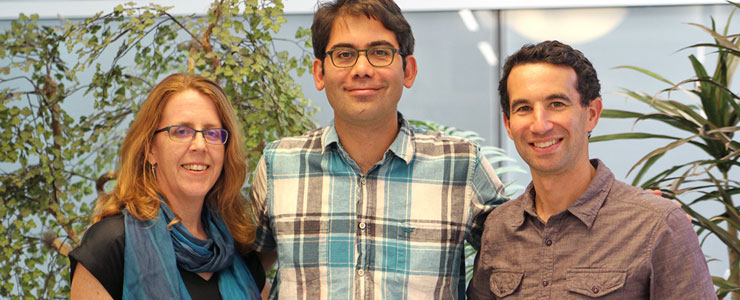Center for Human Rights Science Adds Staff in Statistics, Media Analytics

Carnegie Mellon University’s Center for Human Rights Science (CHRS) has hired two new staff members to help advance the state of human rights documentation and build collaborations between scientists and human rights advocates.
Robin Mejia joins CHRS as manager of the Statistics and Human Rights Program, which develops and applies statistical techniques to analyze human rights violations and conflict dynamics. Enrique Piracés will manage the Media and Human Rights Program. This program seeks to harness the potential of new forms of visual data, especially from smartphones with high-quality cameras, in human rights advocacy, accountability and fact-finding.
Jay D. Aronson, director and founder of CHRS is excited about the experience and expertise that Mejia and Piracés bring to CMU.
“I can’t wait to see how they will strengthen existing relationships with human rights practitioners and which new partners they bring on board,” said Aronson, associate professor of science, technology and society in the Dietrich College’s Department of History. “Robin and Enrique are both committed to improving the state of human rights documentation, and know first-hand the challenges that the human rights community faces when collecting, preserving and analyzing data. I am confident that they will be able to enhance the scientific and technical dimensions of these tasks so that human rights practitioners can more effectively work toward their goals.”
Mejia, who also has a courtesy appointment in CMU’s Department of Statistics, earned her master’s degree in public health and Ph.D. in biostatistics from University of California, Berkeley. Her current research seeks to understand the characteristics of child abductions during El Salvador’s civil war and, in collaboration with colleagues from the Human Rights Data Analysis Group, patterns of death reporting in Syrian conflict.
Before returning to graduate school, Mejia spent more than a decade as a science journalist, writing for publications including Science, Nature, Wired, the Washington Post and Los Angeles Times. Her award-winning documentary for CNN, “Reasonable Doubt,” highlighted problems at forensic laboratories around the country that were sending innocent people to prison.
Building on this work, Mejia will expand CHRS’s efforts to apply statistical methods to issues in law enforcement, forensic science and criminal justice.
“I’ve been deeply impressed by the commitment faculty and students here have to focusing their talents and technical expertise on complex real-world problems,” said Mejia. “People in the human rights community are increasingly recognizing the need for data-driven approaches to crisis response and transitional justice, yet often aren't trained in statistical thinking. I look forward to expanding our partnerships and contributions to this incredibly important set of needs.”
Piracés has worked at the intersection of human rights, science and technological innovation for more than 15 years. Previously, he served as vice president of the Human Rights Program at Benetech and spent seven years at Human Rights Watch.
His focus has been both the implications of the use of technology in the context of human rights as well as the opportunities that new scientific and technological developments open for non-governmental organizations (NGOs) and practitioners.
Among other responsibilities, Piracés will serve as a liaison between the human rights community and researchers at Carnegie Mellon, ensuring that the methods and tools developed at CMU can be effectively integrated into the workflows of human rights practitioners.
“The Center for Human Rights Science at Carnegie Mellon has become a valuable space for the advancement of human rights practice—its collaborative approach to knowledge creation has become increasingly recognized by the human rights community over the past few years," said Piracés. "My goal in joining the center is to enhance the ability of human rights defenders and practitioners to access the work being done here, and also to ensure that Carnegie Mellon researchers are aware of the broad range of human rights documentation challenges that exist in the field.”
Funding from the MacArthur Foundation, Oak Foundation and National Science Foundation supports the positions.
Related Articles:
- Center for Human Rights Science Secures Over $1M for Video, Image Analysis
- CHRS Receives Grant to Study How Social Media and Big Data Affect Protection of Human Rights
- Carnegie Mellon Partners With Human Rights Data Analysis Group to Improve Syrian Casualty Reporting
- CHRS Receives $1.2 Million NIH Grant to Develop Ethics, Policy Recommendations for Post-Conflict, Post-Disaster DNA ID Practices
_____
Contact: Shilo Rea
